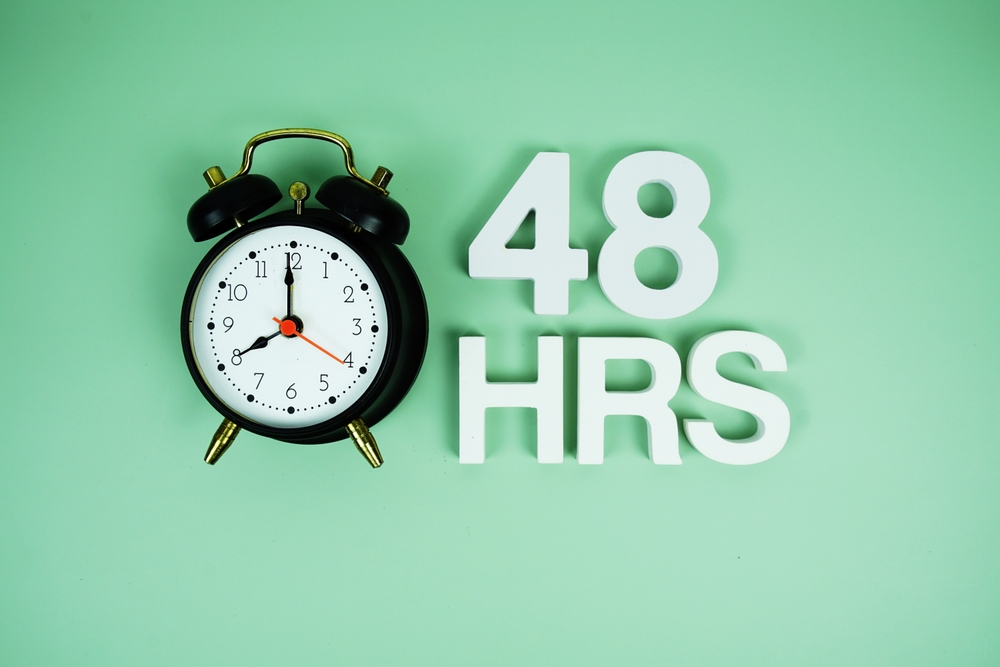Table Of Contents
Want to know the difference between 48 and 72 hour fast? Wondering what the 48-hour fast benefits are? Keep reading because, in this article, we’re going to discuss how the 48 hour fast works, who it’s suitable for, and how to safely undergo a two-day-long fast.
We will also compare 48 vs 72 hour fast so you can determine which one, if any, is the most suitable for you.
What is a 48-Hour Fast?
The 48-hour fast isn’t a new concept, and lots of people still undergo regular two-day fasts. It’s a form of intermittent fasting that involves avoiding food for 48 hours to encourage the body to break down fat for energy and promote weight loss.
Why Does a 48-Hour Fast Work?
A 48 hour fast works by promoting a process known as autophagy, where the body breaks down and recycles damaged cells or cell components. This process occurs naturally and constantly in the body but undergoing a long fast can increase the rate of autophagy and enable your body to ‘use up’ more of its old and dodgy cells.
Whether you’re comparing a 48 hour fast vs 72 hour fast, your body will undergo the same shift in energy production. Because you’re not consuming any glucose from foods, your body is forced to start producing energy through the breakdown of damaged cells or cell components, old cells or cell components, and fat cells.
When your body enters a fasted state and breaks down fat, it starts to produce compounds known as ketones that it can use for energy. It also breaks down old cells and cell components to produce more energy because it’s not getting the energy it requires from foods.

What Are the Health Benefits of a 48-Hour Fast?
Before we cover the 48 hour fast benefits, it’s important to realize that a long fast isn’t suitable for everybody. Not everybody will experience the following benefits, even if they do a shorter, 24 hour fast. For example, individuals who are pregnant, breastfeeding, or have a history of eating disorders should not attempt such a long fast (or any extended fast, for that matter).
It’s important to contact a registered dietitian and work closely with them before you attempt a 48 hour fast to ensure you do so in a safe way. Your chosen registered dietitian will provide guidance on how to approach a two-day-long fast and come out of the fast safely to avoid potential side effects or health complications.
That being said, let’s take a look at the potential benefits of following a 48 hour fast.
It Promotes Autophagy
As we mentioned above, fasting for 48 hours can trigger a process known as autophagy, where the body breaks down and recycles damaged or dysfunctional cells and cell components. Autophagy can promote cellular regeneration and is thought to help slow down ageing.
Fasting for 48 hours every so often can allow your digestive system to rest and focus on breaking down built-up cells and cell components and getting them out of the way.
It Can Reduce Inflammation
Research has shown that 48 hour fast can help lower the levels of inflammation in the body. Chronic inflammation has been associated with a wide range of health issues, including autoimmune conditions, obesity, diabetes, and even some cancers, so keeping your inflammation down is key for your long-term health.
Fasting just once a week or once every two weeks can lower inflammation enough to reduce blood pressure and help with blood sugar regulation, both of which are key for avoiding cardiovascular disease and metabolic issues.
It Can Improve Your Insulin Sensitivity
Recent research has also suggested that a 48 hour fast can promote better insulin sensitivity and lower the risk of long-term metabolic disorders like diabetes, metabolic syndrome, or even polycystic ovary syndrome (PCOS).
Even if you’re looking at a 24 vs 48 hour fast, you can experience the insulin sensitivity-boosting benefits of food avoidance. In fact, some research suggests that a 12 hour fast could be long enough to lower the risk of type 2 diabetes and promote better overall health.
It May Aid Weight Loss

Fasting for 48 hours means you’re not consuming any calories at all during this period of time. As a result, your overall calorie intake for the week will be lower than usual, assuming you don’t overcompensate and eat more than you need following the fast.
Therefore, if you’re trying to lose weight, undergoing an extended fast that lasts 48 hours could be beneficial. Lowering your overall calorie intake can promote weight loss, but fasting and avoiding food completely for two days can promote even more fat-burning than a slight calorie deficit for a longer period of time.
This is because when your body has absolutely no calories coming in, it will use up all of its stored glucose (glycogen) and then switch to metabolising stored fat to provide energy for its metabolic processes and for any physical activity you do.
The more fat you burn, the more weight you will lose and the better you will feel (if weight loss is your goal, of course)!
Also, read – The Definitive Fasting Timeline: Understand Benefits and Phases
It Can Boost Your Cognitive Function and Mental Clarity
Believe it or not, your brain can benefit from a 48 hour fast. Studies have shown that fasting for an extended period of time can promote better cognitive function by increasing the levels of a compound called brain-derived neurotrophic factor (BDNF).
BDNF is often called ‘miracle grow’ for neurons as it can promote neuron growth and survival and may even aid the creation of new connections between neurons.
However, with this in mind, the research is relatively limited at this point, and we still need more studies to confirm the BDNF-boosting effects of fasting to be sure about it.
Some people also say that fasting makes them feel clearer and fresher, enabling them to focus and concentrate on their daily tasks more easily. Fasting may promote mental clarity because it enables you to forget about food and focus on your work tasks, errands, or socializing. It may also be due to the production of ketones for energy and the downregulation of glucose usage.
It Can Elevate Your Mood
Fasting can elevate your mood and lower the risk and severity of anxiety and depression. It’s thought that these mental benefits are due to the increase in BDNF and other mood-boosting neurotransmitters like serotonin and dopamine that occur in the brain whilst it is in a fasted state.
48-Hour Fast or 72-Hour Fast – Which is Better?
We’ve mentioned that there are a few popular timeframes for fasting, two of which are 48 hours and 72 hours. Let’s compare 48 hour fast vs 72 hour fast to determine whether there are actually any differences between fasting for two consecutive days or three consecutive days.
- Both a two-day and a three-day fast can provide lots of health benefits as we have spoken about above.
- Both cause your body to enter a fasted state, which leads to the breakdown of fat and the production of ketones.
- Both can also lead to lower inflammation throughout the body (systemic inflammation), easier weight loss, and improvements in insulin sensitivity, focus, mental clarity, and mood.
However, completing a 72 hour fast may enable the body to enter a deeper state of ketosis, where it metabolises a higher volume of fat cells due to having to survive a longer period without any incoming glucose, protein, or fats from ingested foods. A faster rate of fat breakdown means even better weight loss and better insignia sensitivity, further reducing the risk of type 2 diabetes, metabolic syndrome, and other insulin-related issues.
A 72-hour fast also provides a wider window of opportunity for the body to break down old and damaged cells and cell components. This may, in turn, promote faster recovery and regeneration across the entire body, which can make you look more youthful and feel more energised.
- Again, we want to reiterate that you will need to get professional assistance if you’re going to complete a 48 or 72 hour fast, especially if it’s your first time doing an extended fast. Always speak to a dietitian first and allow them to work with you during the fast.
They will provide information about the most nutrient-dense foods to consume during the period after your fast to ensure optimal health throughout. You might be better looking at a 24 vs 48 hour fast first before you attempt one.
Also, read – Find Your Top Free Intermittent Fasting App between 6 Suggestions
Who Should Avoid 48-Hour Fasting?
Those who are pregnant or breastfeeding should not undergo any type of extended fast to avoid putting the baby’s growth and development at risk and ensure adequate nutrition for both the mum and baby.
Those who have a history of an eating disorder or disordered eating should also avoid fasting for an extended period of time to avoid any triggering thoughts or compulsive behaviors. Even if you feel like you could cope with completing a long period of fasting without triggering any obsessive or compulsive thoughts, it’s best to avoid fasting altogether.
This is particularly true if you are still recovering from an eating disorder and establishing a healthier relationship with food.
How to Prepare for a 48-Hour Fast?

Proper preparation can set you up for success and help to minimize the potential side effects of fasting. Here are some helpful tips to ensure you have an enjoyable and successful fast:
- Work alongside a registered dietitian.
- Slowly decrease your calorie intake in the days leading up to the fast so your body can ‘get used’ to a lower calorie intake and adjust hunger signals and energy production processes accordingly.
- Drink enough water to stay hydrated. Not only is water essential to keep your body and brain functioning optimally, but it also helps you feel fuller and more satisfied during your fast.
- Consume nutrient-dense meals in the few days leading up to the fast to provide your body with all of the essential nutrients it needs for the fast.
- Avoid vigorous, high-intensity exercise in the days leading up to the fast to avoid fatiguing your body, and continue this during the fast to avoid low blood sugar levels and low blood pressure. Instead, focus on light and gentle exercise to keep your body moving without any negative side effects.
- Consider taking supplements in the days leading up to the fast and during the fast to ensure you still get enough nutrients throughout and support your body as much as possible.
Breaking a 48-Hour Fast Safely – How to Do?
There are a few things to keep in mind when you’re coming out of a 48 hour fast. After an extended period of time without food, your digestive system can become overly sensitised to food, so it’s important to gradually increase your intake in the days following your fast and avoid having large meals as soon as your fast has finished.
Aim to consume foods that are high in nutrients and relatively plain. You don’t want to go for spicy, fatty, or highly processed foods that could trigger your digestive system and cause nasty symptoms like bloating, gas, and indigestion.
Here are some suggestions for what you could eat after you have completed a 48-hour fast to ensure you get the best results and don’t cause digestive discomfort:
- Leafy greens and salad vegetables like cucumber, lettuce, and tomatoes.
- A variety of fruits.
- Foods containing lots of healthy fats like nuts, seeds, and avocados.
- High protein foods like chicken, turkey, fish, and meat alternatives like tofu and tempeh.
- Soups and broths that are easy to digest but can be made with lots of nutritious vegetables and meats.
It is best to avoid high-calorie, high-sugar, and high-fat foods when you come out of your fast that could counteract the positive effects of an extended 48 hour fast. These foods could also upset your digestive system and cause you to feel nauseous in the day or two following your fasting period.
Final Thoughts
So, when implemented in a mindful way, the 48-hour fast can be very helpful for improving metabolism, clearing the mind and for weight loss. While some people’ll benefit from this newly popular extended fasting approach, others may have a lot of difficulty doing it or find that it actually harms their health if they have certain medical conditions or if they have a hard time eating healthily afterwards.
Get this into your head, people: Healthy habits are dependent on lifetime behaviors not fad diets. Having a 48-hour fast lifestyle, if properly coordinated, may be an occasional break to accompany other healthful habits. It helps to approach it with caution, be well-hydrated and focus on taking proper care of oneself, in order to be safe while doing it right.
William is from Canada, he is passionate nutrition & wellness writer. William understands that the topic of wellness is still not well understood, so his goal is to enlighten and teach people how to live healthier and happier in their bodies.









